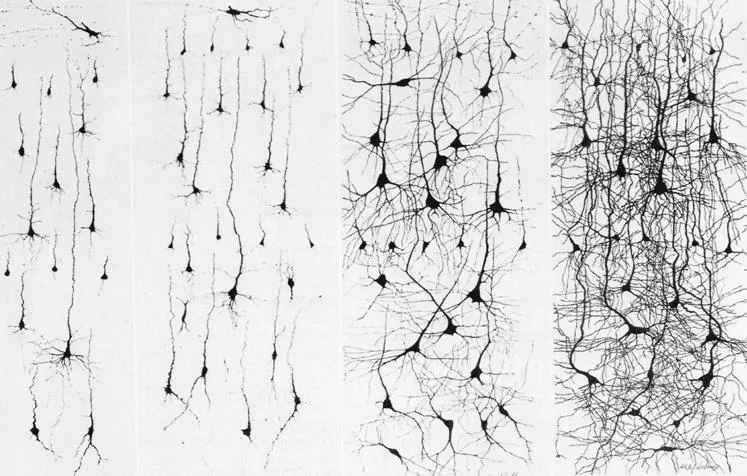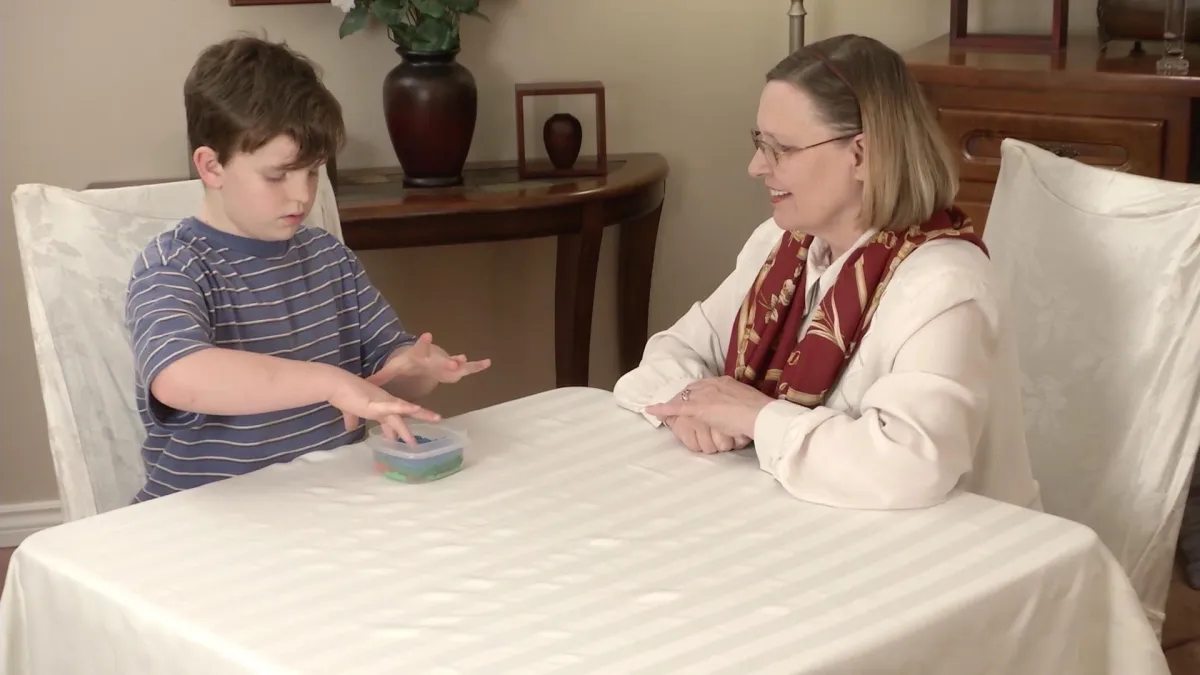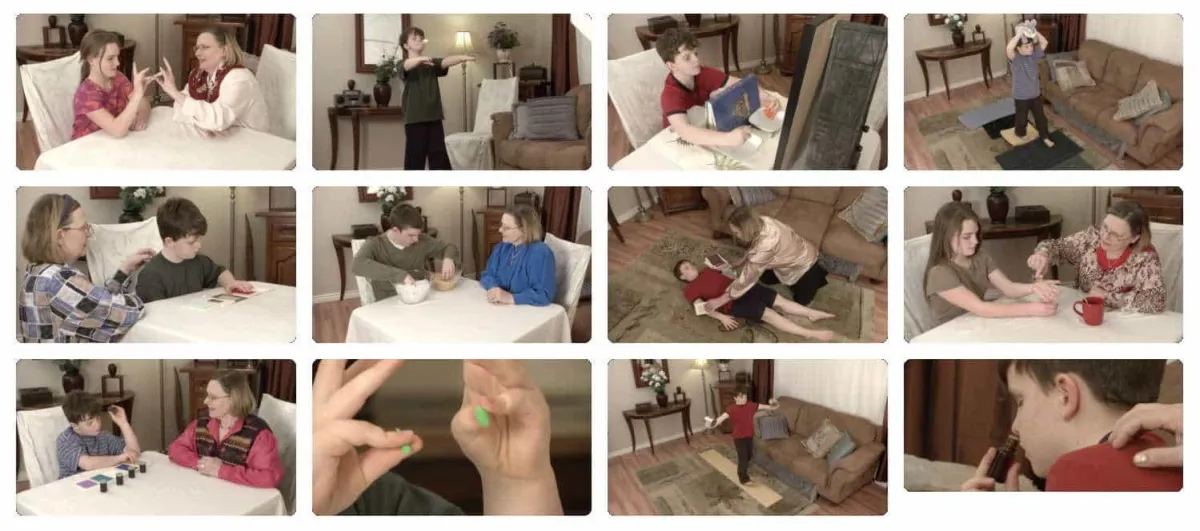Does your child struggle with intellectual disabilities?
How about a therapy program clinically proven to increase IQ?
We believe that you will see changes within the first TWO WEEKS of therapy.
Tailored enrichment therapy is designed to boost brain plasticity in targeted brain functions
• Emotion (motivation to engage with other people),
• Self-awareness (where do I fit in space and this social world?),
• Fine motor (can I control my voice box, lips, breathing, etc.?),
• Auditory processing (can I hear myself speak?),
• Memory and learning (vocabulary, sentence structure),
• Mental image (can I picture what I want to say in my mind?), etc.
As these tools improve in the brain, the bottlenecks that slowed down natural speech development should fade away.
We understand that your child may be experiencing the following:
• Tantrums and other behavior issues
• Difficulty with problem-solving or logical thinking
• Difficulty understanding social rules
• Difficulty connecting actions with consequences
• Slow to crawl, sit up or walk
• Slow to potty train, dress or feed independently
Parents have noticed dramatic differences in helping their children overcome fears, panic attacks, and more:
• Improvement in memory
• Improvement in social skills
• Better at problem-solving or thinking logically
• Increased self-confidence at school
• Better performance at school
• Improvement in language and literacy skills
• Gain in independent living skills

"This is really working! My toddler has started using functional language!
His cognition has improved, his motor skills are getting way better, he is finally starting to climb and point and wave and able to copy signs.
He has been blossoming intensely, really catching up at a faster rate. Now we have SO much hope!”
- Melissa M. (New Zealand) parent of a 3-year-old boy
“My daughter is considered high functioning but she was never very affectionate and really suffered with processing information.
Now she will come to me and put her head on my shoulder and tell me she loves me. And she will hug people in our family without being reminded.
This might not seem like a big deal but for me and my family it is so wonderful. She also is understanding information well.”
- Becca T. (Colorado) parent of a 5-year-old girl
“[My daughter] is high functioning with Asperger's Syndrome, but her father and I knew she would never manage an independent life.
In June, after our dedicated attention to the exercises we were given, she did not meet a single criteria from the old DSM-IV that she was diagnosed under.
Her goals now include leaving home to go to school and living her own life.”
- Linda P. (Canada) parent of a 19-year-old girl
The sensory connection
Research has shown that like in many other neurological issues, sensory processing problems in the brain may be a common condition for children who struggle with intellectual and learning disabilities.
Brain plasticity
The good news is that the brain is like a muscle, the more you use it the better it does.
And just as a workout can help develop better muscle tone, exercising the sensory pathways in the brain can help the brain develop and increase cognitive and learning abilities.
A workout for your child’s brain
Follow customized exercises to help your child overcome intellectual disabilities
Sensory Enrichment Therapy uses a safe multisensory approach to help children cope better with intellectual difficulties.
You’ll increase your child’s brain plasticity to improve his ability to process the real environment comfortably and cope with change and challenging situations from home with simple touch, smell, temperature response, and balance exercises.

Mendability goes beyond teaching strategies for focus
Sensory exercises target areas of attention and focus in the brain to foster neuron connections and increase brain growth.
A similar approach is used to treat ADHD.
Sensory Enrichment Therapy
Sensory Enrichment Therapy is a subset of Environmental Enrichment, which is the field of neuroscience that looks at the plasticity of the brain and the types of experiences (cognitive, sensory, social, motor, etc.) that can have an impact on brain development and brain function.
With Sensory Enrichment Therapy we focus on sensory and motor experiences because they are the ones that have the most clinical evidence showing a positive impact.
Mendability developed Sensory Enrichment Therapy as program based on daily, short, hands-on games designed to trigger a boost in activity and growth in targeted brain functions.
The program is updated every two weeks based on the participant's response, progress, and goals.

Behavior and Environmental Enrichment
Animal research suggests that Environmental Enrichment and enhanced Multisensory Stimulation can impact behaviors.
Utsunomiya R, Mikami K, Doi T, Choudhury ME, Jogamoto T, Tokunaga N, Ishii E, Eguchi M, Yano H, Tanaka J. Rearing in an Enriched Environment Ameliorates the ADHD-like Behaviors of Lister Hooded Rats While Suppressing Neuronal Activities in the Medial Prefrontal Cortex. Cells. 2022 Nov 17;11(22):3649. doi: 10.3390/cells11223649. PMID: 36429076; PMCID: PMC9688563.
Coopersmith R, Weihmuller FB, Kirstein CL, Marshall JF, Leon M. Extracellular dopamine increases in the neonatal olfactory bulb during odor preference training. Brain Res. 1991 Nov 8;564(1):149-53. doi: 10.1016/0006-8993(91)91365-8. PMID: 1777817.
Corredor K, Duran JM, Herrera-Isaza L, Forero S, Quintanilla JP, Gomez A, Martínez GS, Cardenas FP. Behavioral effects of environmental enrichment on male and female wistar rats with early life stress experiences. Front Physiol. 2022 Sep 26;13:837661. doi: 10.3389/fphys.2022.837661. PMID: 36225294; PMCID: PMC9548697.
Batistuzzo A, de Almeida GG, Brás TS, Zucato VP, Arnold AJT, Giannocco G, Sato JM, Yamanouchi LM, Dias E, Lorena FB, do Nascimento BPP, Bianco AC, Ribeiro MO. Multisensory Stimulation Improves Cognition and Behavior in Adult Male Rats Born to LT4-treated Thyroidectomized Dams. Endocrinology. 2022 Sep 1;163(9):bqac105. doi: 10.1210/endocr/bqac105. PMID: 35914267; PMCID: PMC9354969.
Groß C, Serrallach BL, Möhler E, Pousson JE, Schneider P, Christiner M, Bernhofs V. Musical Performance in Adolescents with ADHD, ADD and Dyslexia- Behavioral and Neurophysiological Aspects. Brain Sci. 2022 Jan 18;12(2):127. doi: 10.3390/brainsci12020127. PMID: 35203891; PMCID: PMC8870592.
Hobbiesiefken U, Mieske P, Lewejohann L, Diederich K. Evaluation of different types of enrichment - their usage and effect on home cage behavior in female mice. PLoS One. 2021 Dec 23;16(12):e0261876. doi: 10.1371/journal.pone.0261876. PMID: 34941949; PMCID: PMC8699725.
Chan YS, Jang JT, Ho CS. Effects of physical exercise on children with attention deficit hyperactivity disorder. Biomed J. 2022 Apr;45(2):265-270. doi: 10.1016/j.bj.2021.11.011. Epub 2021 Nov 29. PMID: 34856393; PMCID: PMC9250090.
Ball NJ, Mercado E 3rd, Orduña I. Enriched Environments as a Potential Treatment for Developmental Disorders: A Critical Assessment. Front Psychol. 2019 Mar 6;10:466. doi: 10.3389/fpsyg.2019.00466. PMID: 30894830; PMCID: PMC6414413.
Normann MC, McNeal N, Dagner A, Ihm E, Woodbury M, Grippo AJ. The Influence of Environmental Enrichment on Cardiovascular and Behavioral Responses to Social Stress. Psychosom Med. 2018 Apr;80(3):271-277. doi: 10.1097/PSY.0000000000000558. PMID: 29360667; PMCID: PMC8283515.
Human translation
What we have done is to translate animal model protocols into short, fun, hands-on games you can do at home, at school or in your treatment facility.


More questions? More examples of games?
3,000+
Join 3,000+ other families who have also followed Mendability's Sensory Enrichment Therapy!
“This is really working! My toddler has started using functional language!
His cognition has improved, his motor skills are getting way better, he is finally starting to climb and point and wave and able to copy signs. He has been blossoming intensely, really catching up at a faster rate. Now we have SO much hope!”
– Melissa M. (New Zealand)
parent of a 3-year-old boy
“I think that [my son] is responding great to the therapy! He definitely seems to be following instructions better across the board and is just a little more aware of the world around him.
We have also seen some improvements in speech, pronunciation, eating, handwriting and overall function.”
– Sara J. (California)
parent of a 4-year-old boy
“I went to the library where we spent about 2 hours, and both of the girls were happily reading while staying in their seats. In our prior visits, the oldest one just roamed and ran around the library while I chased her. This time, I was pleasantly surprised by how long my oldest daughter (4) sat and stayed focus on reading. This has never happened before!”
– Mary M. (Texas)
parent of a 4-year-old-girl

The top 5 areas where parents report the most improvements in the first few weeks are Sleep, Eating, Social Skills, Attention and Sensory Processing
2011 - 2026 © Mendability - All Rights Reserved
